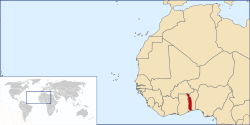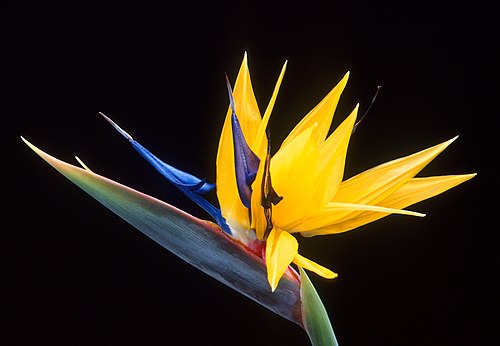Portal:Africa



Africa is the world's second-largest and second-most populous continent after Asia. At about 30.3 million km2 (11.7 million square miles) including adjacent islands, it covers 20% of Earth's land area and 6% of its total surface area. With nearly 1.4 billion people as of 2021, it accounts for about 18% of the world's human population. Africa's population is the youngest among all the continents; the median age in 2012 was 19.7, when the worldwide median age was 30.4. Based on 2024 projections, Africa's population will exceed 3.8 billion people by 2100. Africa is the least wealthy inhabited continent per capita and second-least wealthy by total wealth, ahead of Oceania. Scholars have attributed this to different factors including geography, climate, corruption, colonialism, the Cold War, and neocolonialism. Despite this low concentration of wealth, recent economic expansion and a large and young population make Africa an important economic market in the broader global context, and Africa has a large quantity of natural resources.
Africa is highly biodiverse; it is the continent with the largest number of megafauna species, as it was least affected by the extinction of the Pleistocene megafauna. However, Africa is also heavily affected by a wide range of environmental issues, including desertification, deforestation, water scarcity, and pollution. These entrenched environmental concerns are expected to worsen as climate change impacts Africa. The UN Intergovernmental Panel on Climate Change has identified Africa as the continent most vulnerable to climate change.
The history of Africa is long, complex, and varied, and has often been under-appreciated by the global historical community. In African societies the oral word is revered, and they have generally recorded their history via oral tradition, which has led anthropologists to term them "oral civilisations", contrasted with "literate civilisations" which pride the written word. African culture is rich and diverse both within and between the continent's regions, encompassing art, cuisine, music and dance, religion, and dress.
Africa, particularly Eastern Africa, is widely accepted to be the place of origin of humans and the Hominidae clade, also known as the great apes. The earliest hominids and their ancestors have been dated to around 7 million years ago, and Homo sapiens (modern human) are believed to have originated in Africa 350,000 to 260,000 years ago. In the 4th and 3rd millennia BCE Ancient Egypt, Kerma, Punt, and the Tichitt Tradition emerged in North, East and West Africa, while from 3000 BCE to 500 CE the Bantu expansion swept from modern-day Cameroon through Central, East, and Southern Africa, displacing or absorbing groups such as the Khoisan and Pygmies. Some African empires include Wagadu, Mali, Songhai, Sokoto, Ife, Benin, Asante, the Fatimids, Almoravids, Almohads, Ayyubids, Mamluks, Kongo, Mwene Muji, Luba, Lunda, Kitara, Aksum, Ethiopia, Adal, Ajuran, Kilwa, Sakalava, Imerina, Maravi, Mutapa, Rozvi, Mthwakazi, and Zulu. Despite the predominance of states, many societies were heterarchical and stateless. Slave trades created various diasporas, especially in the Americas. From the late 19th century to early 20th century, driven by the Second Industrial Revolution, most of Africa was rapidly conquered and colonised by European nations, save for Ethiopia and Liberia. European rule had significant impacts on Africa's societies, and colonies were maintained for the purpose of economic exploitation and extraction of natural resources. Most present states emerged from a process of decolonisation following World War II, and established the Organisation of African Unity in 1963, the predecessor to the African Union. The nascent countries decided to keep their colonial borders, with traditional power structures used in governance to varying degrees. (Full article...)
Selected article –
On 12 April 2012, a coup d'état in Guinea-Bissau was staged by elements of the armed forces about two weeks before the second round of a presidential election between Carlos Gomes Júnior and Kumba Ialá. The coup started in the evening with military personnel and equipment making its way onto the streets, followed by the state-owned media being taken off-air.
Both second-round candidates and the incumbent president were initially arrested by the junta. Members of the Military Council, which ran the country until an interim National Transitional Council was established on 15 April, said that one of the reasons for the coup was the incumbent civilian administration's call for Angolan help to reform the military. Following international condemnation and sanctions against leaders of the junta, an agreement was signed that led to the third place candidate in the election, Manuel Serifo Nhamadjo, being selected as interim president. The presidential election was aborted and postponed for at least two years into the future. An interim government was tasked with administering Guinea-Bissau in the meantime. (Full article...)
Featured pictures –
Did you know (auto-generated) -

- ... that a former member of the French Senate ended up being exiled to the northern Central African Republic by the future emperor?
- ... that in 1890 Cornelius N. Dorsette, often referred to as the first African-American physician in Alabama, founded Hale Infirmary, a hospital for Black patients and staff in Montgomery?
- ... that nursing educator Helen Turner Watson was one of the first African-American women to become a commissioned officer in the United States Navy?
- ... that Malaysian businessman Lim Kok Wing was depicted as "King of Africa"?
- ... that the two known populations of the desert musk shrew are found on opposite ends of Africa?
- ... that in South Africa's genocide case against Israel, the International Court of Justice ordered Israel to "punish the direct and public incitement to commit genocide" against Palestinians in Gaza?
Categories
Selected biography –
Eusèbe Jaojoby (born 29 July 1955), commonly known by his surname Jaojoby [ˈdzodzubʲ], is a Malagasy composer and singer of salegy, a musical style of northwestern Madagascar. Critics consider him to be one of the originators of the modern salegy style that emerged in the 1970s, and credit him with transforming the genre from an obscure regional musical tradition into one of national and international popularity. Jaojoby also contributed to the creation of two salegy subgenres, malessa and baoenjy. Jaojoby has been called the most popular singer in Madagascar and the Indian Ocean islands, and is widely referred to as the "King of Salegy". His success has earned him such honors as Artist of the Year in Madagascar for two consecutive years (1998–1999) and the role of Goodwill Ambassador for the United Nations Population Fund in 1999.
In 1970 Jaojoby began singing in the northern coastal town of Diego-Suarez. He performed with bands that were experimentally blending American soul and funk with the Malagasy musical traditions of the region. The artist gained popularity and toured regionally, producing four singles with The Players before the band broke up in 1979. After a short break in the 1980s to pursue a career in journalism, Jaojoby resumed his musical career and rose to national prominence with his 1988 hit "Samy Mandeha Samy Mitady". He then reoriented his career toward music, recording his first full-length album in 1992 and becoming a full-time professional musician the following year. He has since released eight full-length albums and has toured extensively in Madagascar and abroad accompanied by his wife and adult children, who perform in the band with him. (Full article...)
Selected country –
 |
 |
||

| |||
Togo, or the Togolese Republic, is a country in West Africa bordering Ghana in the west, Benin in the east, Burkina Faso in the north, and the Gulf of Guinea in the south, where the capital Lomé is located.
Togo's small sub-Saharan economy is heavily dependent on both commercial and subsistence agriculture, which provides employment for 65% of the labor force. Cocoa, coffee, and cotton together generate about 30% of export earnings. Togo is self-sufficient in basic foodgoods when harvests are normal, with occasional regional supply difficulties. In the industrial sector, phosphate mining is by far the most important activity, although it has suffered from the collapse of world phosphate prices and increased foreign competition.
Togo's culture reflects the influences of its 37 ethnic groups, the largest and most influential of which are the Ewe, Mina[disambiguation needed], and Kabre. Despite the influences of Christianity and Islam, over half of the population follow native animistic practices and beliefs. French is the official language. (Read more...)
Selected city –

N'Djamena (English: /əndʒɑːˈmeɪnə/ ⓘ ən-jah-MAY-nə) is the capital and largest city of Chad. It is also a special statute region, divided into 10 districts or arrondissements, similar to the city of Paris.
The city serves as the centre of economic activity in Chad. Meat, fish and cotton processing are the chief industries, and it is a regional market for livestock, salt, dates, and grains. (Full article...)
In the news
- 28 April 2025 – Red Sea crisis
- According to the Houthis, 68 people are killed and 47 others are injured in a U.S. airstrike on a prison holding African migrants in Saada Governorate, Yemen. (CTV News)
- 28 April 2025 – Somali Civil War
- Several mortars from alleged Al-Shabaab militants strike Aden Adde Airport and Halane Camp, the residences of the UNSOM, AUSSOM, and foreign embassies. (Hiiraan Online)
- 27 April 2025 – Sudanese civil war
- Rapid Support Forces militants kill over 31 civilians, including minors, in a mass shooting near al-Salha, Omdurman. (Sudan Tribune)
- 26 April 2025 – Islamist insurgency in the Sahel
- Twelve soldiers are killed in clashes with militants near the village of Sakoira, Niger. (Reuters)
- 24 April 2025 – Somali Civil War
- Al-Shabaab militants seize the town of Wargaadhi and its military base in Middle Shabelle, Somalia. More than 40 militants and twelve clan fighters are killed in related combat. (Al Jazeera)
- 24 April 2025 – Islamist insurgency in the Sahel
- The Beninese government announces that 54 soldiers were killed in an attack by Jama'at Nasr al-Islam wal Muslimin (JNIM) in the north of the country last week, after previously announcing only eight soldiers were killed. JNIM claims 70 soldiers were killed in the attack. (BBC News)
Updated: 0:05, 29 April 2025
General images -
Africa topics
More did you know –
- ... that Liberia College in the country of Liberia was authorized by the legislature in 1851, but did not start classes until 1863?
- ... that the forced removal of 700,000 people from slums in Zimbabwe in 2005 was called "a crime against humanity" by the UN?
- ... that the supreme god of the southern African Bushmen is Cagn, a trickster who shapeshifts into a praying mantis?
- ... that Bahá'í Faith in Niger began during a period of wide scale growth in the religion across Sub-Saharan Africa near the end of its colonial period?
Related portals
Major Religions in Africa
North Africa
West Africa
Central Africa
East Africa
Southern Africa
Associated Wikimedia
The following Wikimedia Foundation sister projects provide more on this subject:
-
Commons
Free media repository -
Wikibooks
Free textbooks and manuals -
Wikidata
Free knowledge base -
Wikinews
Free-content news -
Wikiquote
Collection of quotations -
Wikisource
Free-content library -
Wikispecies
Directory of species -
Wikiversity
Free learning tools -
Wikivoyage
Free travel guide -
Wiktionary
Dictionary and thesaurus



























































































